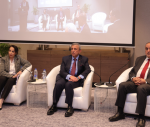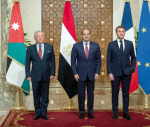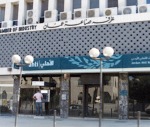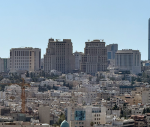You are here
Jordan first developing country to install solar air conditioning — Khayyat
By Hana Namrouqa - Feb 06,2017 - Last updated at Feb 06,2017
AMMAN — Jordan is the first developing country utilising solar energy for the cooling and heating of buildings, Minister of Environment Yaseen Khayyat said on Monday.
Under a 4.3-million-euro programme funded by the German international cooperation agency (GIZ) to introduce thermal cooling technology to Jordan and the region, four sites in Jordan are now equipped with units that turn sunlight into electricity that powers cooling units.
The four sites are the German Jordanian University, the Petra Guest House, Irbid Chamber of Commerce and the Royal Cultural Centre, where the ministry on Monday organised a ceremony marking the completion of the programme.
Using solar power for the cooling and heating of buildings is a milestone in the search for environment-friendly technologies in the energy sector, Khayyat said during the ceremony.
The minister noted that power consumption dropped by 40 per cent at the four locations following the installation of the thermal cooling systems.
“The state-of-the-art systems will not only reduce power consumption and encourage the use of renewable energy resources, but will also serve as a reference for researchers and experts in the field, as it is the first of its kind to be implemented in Jordan, the region and among developing countries,” Khayyat said.
The four locations across the country now serve as a model for sustainable air conditioning in Jordan, according to Ahmad Hajj Yaseen, head of engineering at Millennium Energy Industries, the company that implemented the project.
The project will also make Jordan a regional hub for the solar thermal cooling technology, Hajj Yaseen said, stressing that the installation of solar cooling units cuts down greenhouse gas emissions.
Ministry officials underscored that connecting solar thermal applications with absorption chillers is a state-of-the-art technology that provides decentralised fuel-saving solutions for the Kingdom, especially since 98 per cent of its energy demand is imported at high costs.
Royal Cultural Centre Director General Mohammad Abu Summaqa said that the solar cooling unit installed at the centre will reduce its electricity bill.
“Seventy per cent of the centre’s budget goes to paying the electricity bill, which comes at the expense of implementing programmes and functions at the centre,” the official said.
The Kingdom, which has 330 days of sunshine per year, has one of the highest annual daily averages of solar irradiance in the world, according to official figures.
Renewable energy experts indicate that the Kingdom has a significant amount of untapped wind and solar energy, with wind speeds as high as 7.5 metres per second, up to 11.5 metres per second in hilly areas, and direct solar radiation equalling 5.5 kilowatt hours per square metre per day.
Related Articles
Solar cooling units will be installed at the Royal Cultural Centre (RCC) and the Irbid Chamber of Commerce to reduce power consumption and encourage the use of renewable energy resources, under deals signed Thursday.
AMMAN — Ribhi Daamseh from the Balqa Applied University, has received the golden medal in the Emirates Energy Award for an EU-funded project
AMMAN — Environment Minister Yaseen Khayyat on Saturday announced that Jordan has received a grant worth $3.5 million from the Montreal Fund

Opinion
Apr 07, 2025
Apr 07, 2025
Apr 07, 2025
Apr 06, 2025
- Popular
- Rated
- Commented
Apr 07, 2025
Apr 07, 2025
Apr 07, 2025
Newsletter
Get top stories and blog posts emailed to you each day.
















